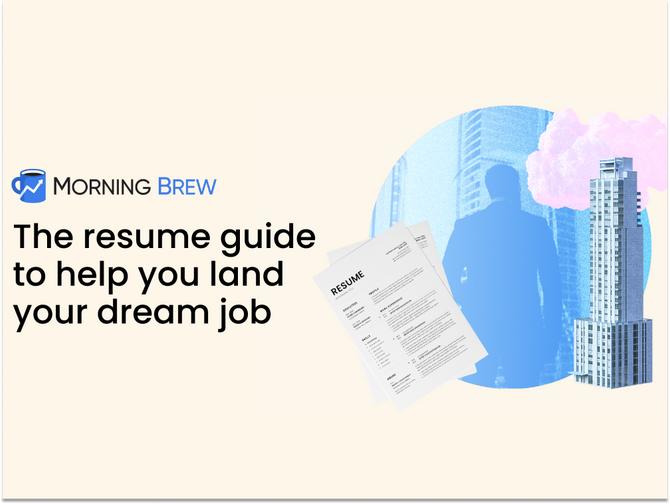Happy Monday! We hope all the moms out there enjoyed a well-deserved day off from cleaning, wiping runny noses, and watching Bluey for the thousandth time. Now, back to cleaning up after grown-ups...
In today’s edition:
 Lay off, pay up Lay off, pay up
 Mother shunners Mother shunners
 Don’t even ask Don’t even ask
—Courtney Vinopal, Kristen Parisi, Sam Blum
|
|
Hannah Minn
Recent earnings reports have brought into focus the financial costs companies are incurring from laying off workers.
Alphabet, Google’s parent company, recently reported it spent $2 billion on severance and other related charges during the quarter ending in March, tied to layoffs affecting around 12,000 workers. Susan Li, CFO for Meta, said in an April 26 earnings call that the company expects to spend $3 billion–$5 billion this year on a restructuring that includes about 21,000 job cuts so far. And Amazon, which has laid off about 18,000 workers since the fall, reported it spent half a billion dollars on severance last quarter.
Executives typically argue layoffs will benefit their firms’ bottom lines in the long run. Rideshare company Lyft, for example, is spending tens of millions of dollars on a restructuring, but has estimated it will deliver $330 million in annual savings for the company once it’s completed.
Research has shown, though, that the costs of layoffs don’t always outweigh the benefits.
Keep reading.—CV
|
|
Ready to land your dream job? It all starts with a killer resume. But crafting one that truly stands out can be a daunting task. That’s why we’ve created the ultimate guide to building a strong and effective resume.
This guide is jam-packed with practical tips and real-world examples to help you craft a resume that will impress even the toughest hiring managers. We’ll show you how to highlight your skills and experience in a way that makes you stand out from the crowd. So if you’re ready to take your career to the next level, download your copy today.
|
|
Rugrats/Nickelodeon via Giphy
Ask most moms and they might tell you that all they wanted for Mother’s Day was sleep, some more sleep, and—dare to dream—the chance to take a bath without someone banging on the door every five minutes because the other parent is seemingly incapable of settling a simple Lego dispute.
What they might not have wanted for Mother’s Day was a copy of this new Indeed survey of moms in the US, which found that while mothers who’ve focused mainly on childcare duties have developed great skills for business, employers may be overlooking their value and “transferability.”
Welcome to the (mother)hood. Mothers, whether they’re new or longtime moms, are building valuable skills that they can bring to a workplace.
Keep reading.—KP
|
|
Photo Illustration: Dianna “Mick” McDougall, Sources: Getty Images
In a new proposed rule, the Biden administration seeks to tackle the issue of pay inequality at the biggest employer in the country: the federal government. The proposal, introduced in May by the Office of Personnel Management, would ban federal agencies from considering the pay history of job candidates, which proponents argue would address pay gaps based on gender, race, and ethnicity while improving barriers to career advancement.
Making salary history, well, history. The rule’s repercussions could be large, and affect roughly 1.5 million of the federal government’s 2.2 million employees, according to Axios. Under the proposal, government agencies would be barred from asking about candidate salary history. According to the agency, such questions “may maintain or exacerbate pay inequity a job candidate experienced in their current or previous employment.”
Determining compensation based on salary history can perpetuate income inequality and discriminatory hiring practices, the agency wrote: “Nationally, women earn less than men, on average, and this pay gap varies by race and ethnicity.” Twenty-one states have banned questions pertaining to salary history, in addition to several city and local laws throughout the country, according to SHRM.
A 2020 study from Boston University researchers found that following the imposition of salary history bans in a dozen states, the pay of women and non-white employees increased by 6.2% and 5.9%, respectively, after they switched jobs.
Seeing a trend here? Keep reading.—SB
|
|
|
Calling HR visionaries. Head to Spark Live on June 8 to talk all things talent. Connect with other business leaders and learn about the future of hiring, retaining, and developing talent from the best in the biz, including keynote speakers Adam Grant and Josh Bersin. Start future-proofing your org with Beamery. Register now.
|
|
Today’s top HR reads.
Stat: Just over 62% of US workers surveyed last year said they were satisfied with their jobs—the highest rate since 1987. (The Conference Board)
Quote: “Moms are doing this lifetime of caring and working for their families, and when it comes to retirement they are just unprepared and aren’t able to go into retirement securely.”—Laura Valle-Gutierrez, a fellow at The Century Foundation, on the statistic that half of mothers don’t have retirement savings (CBS News)
Read: Employers calling workers back to the office have to strike a balance on tone and be mindful of how they wield authority, some leadership experts advise. (the New York Times)
|
|
-
HSBC and Scotiabank were fined by the SEC for employees’ alleged use of personal mobile devices and messaging apps.
-
Railroad workers will lose some of their unemployment and sick benefits as part of a previous measure that was paused during the pandemic.
-
Microsoft will give raises to hourly workers but not salaried employees this year.
-
A bill that would ban size discrimination in New York City has passed the city council and now awaits Mayor Eric Adams’s signature.
|
|
Catch up on the top HR Brew stories from the recent past:
|
|
|







